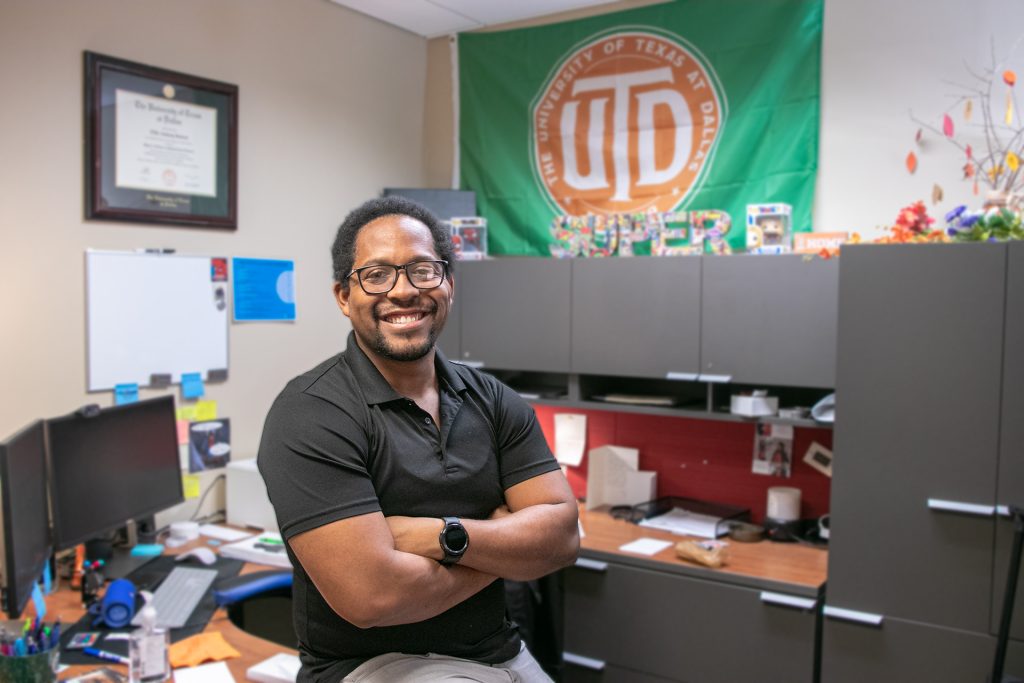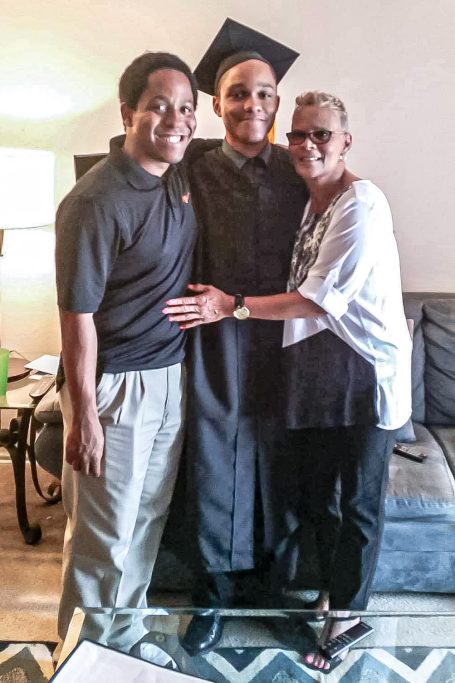Helping First-Generation Students Build Road Maps for Life
By: Jeff Joiner | November 4, 2022

Starting college as a new student is challenging for anyone, but it can be especially hard for students attending college who are the first in their family to go on to higher education. Transitioning to life in college as a first-generation student is full of unknowns if you don’t have parents or other family who have been there before to guide you.
“I would describe it as building something without a blueprint or operating without a road map,” said D’ric Jackson BS’15, MS’17, a UT Dallas program specialist and Dallas native who works with first-generation students and who, with his twin brother, Eric, were the first in their family to earn college degrees. “I succeeded because of the people at UTD who helped me build up that road map as a first-generation student.”
Jackson works in the University’s Office of Undergraduate Education, which started a support program in 2019 for first-generation students. UTD defines first-generation students as those whose parents or guardians did not complete a four-year degree in the United States and includes students transferring to the University. According to Jackson, there are more than 4,000 undergraduate students at UTD this year who are first-generation students.
In an effort led by Courtney Brecheen MPA’09, PhD’17, senior associate dean of undergraduate education and a first-generation student herself, UT Dallas conducted a student needs assessment survey in 2019 that led to the creation of support programs for those students.
“The needs assessment was a game changer,” Brecheen said. “The conversations it led to on campus and the insights that it provided about the student experience were so valuable. You can look at data all day but getting the student’s voice about their experiences was so important.”
After Jackson earned bachelor’s and master’s degrees in psychology at UTD, he was offered a job advising students in the cultural scholars and first-generation student programs. Jackson leads the First-Generation Student Success Course for those living in the First-Generation Living Learning Community on the UT Dallas campus. Because of his own experiences, Jackson is in a perfect position to guide others who are experiencing what he did
“I really pride myself on being able to form a connection with our students because, as a first-generation student myself, that connection is what’s so deeply powerful,” he said. “They need to know immediately that they have an advocate, someone who’s been there before and sat where they are.”
Jackson said he is very transparent about his own experience at UT Dallas, sharing with his students both the good and the bad.
“I show them my grades and tell them what I did right and where I went wrong,” he said. “I talk about the hidden curriculum in higher education, the unwritten rules to succeeding in college. That can be something as simple as not knowing that you can withdrawal from a class that you’re struggling in.”

As a freshman, Jackson struggled in an algebra class and ended up failing. He said the experience was painful, especially when he found out he could have avoided all the anxiety and the hit on his GPA if he had known that he was allowed to withdraw from a class and retake it, he said.
“I actively work with my students today to try to remove that stigma,” Jackson said. “There’s no shame in making the best decision for yourself, because there is a lot of emotion associated with struggling academically, especially for first-generation students. I tell them that failure is not falling down. It’s choosing to stay down.”
Jackson stresses that one of the most important resources first-generation students have at UT Dallas are faculty and staff. He credits several professors who mentored him through his undergraduate years, encouraged him to get involved in research and to pursue a master’s degree. Those mentors also encouraged him to apply to a doctoral program, and he’s now working on a PhD in psychology from the University of North Texas.
“It’s immensely important to be able to connect with mentors and find your people who are going to be your cheerleaders,” Jackson said.
He said he draws inspiration from many of his former psychology professors in the School of Behavioral and Brain Sciences who influenced his fascination with psychology research and encouraged him to go to graduate school, including Dr. Salena Brody, who won the 2022 Presidents Teaching Excellence Award, and Dr. Shayla Holub, who hired Jackson to work in her research lab, The Healthy Development Project.
“That was critical for me because it gave me the research experience I needed to apply to the master’s program,” Jackson said.
Jackson adds that first-gen students also rely on family members who may not have gone to college, but still provide essential encouragement and support as did his own mother, Paula Jackson.
“She said, ‘Listen, I can’t help you with academic advising. I don’t even know what that is, but what I can tell you is I know that there are people there that can help, that can support you.’ That was really key for me during the moments of setbacks,” Jackson said.
Jackson chose to study psychology because he loves to understand people and especially what motivates them. His career goals, now that he is working on a PhD in educational psychology, includes combining his love of research and his UT Dallas position working with students to find ways to help them improve their lives, as others helped him.
“When I was doing my master’s program, that is when I decided I love psychology research, specifically positive psychology,” Jackson said. “I like its application to the betterment of students who are in their formative years of life. I like being a part of a student’s journey and helping set them up for the rest of their lives.”